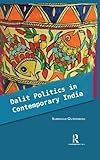Dalit Politics in Contemporary India
Language: English Publication details: Oxford Routledge India 20151014Edition: 1Description: 330 pISBN:- 9781317381044
This book is a ground-breaking intervention on Dalit politics in India. Challenging received ideas, it uses a comparative framework to understand Dalit mobilisations for political power, social equality and justice. The monograph traces the emergence of Dalit consciousness and its different strands in north and south India — from colonial to contemporary times — and interrogates key notions and events. These include: the debate regarding core themes such as the Hindu–Muslim cleavage in the north and caste in the south; the extent to which Dalits and other backward castes (OBC) base their anti-Brahminism on similar ideologies; and why Dalits in Uttar Pradesh (north India) succeeded in gaining power while they did not do so in the region of erstwhile Andhra Pradesh (south India), where Dalit consciousness is more evolved. Drawing on archival material, fieldwork and case studies, this volume puts forward an insightful and incisive analysis. It will be of great interest to researchers and scholars of Dalit studies and social exclusion, Indian politics and sociology.
There are no comments on this title.
